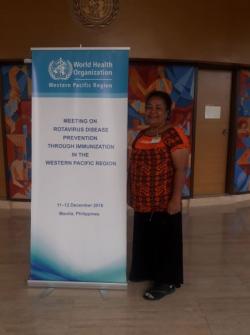The WHO CC UTS acknowledges use of key language from The WHO Global Strategic Directions for Nursing and Midwifery (2021–2025).
Tuvalu is a low-lying island country in the South Pacific that is most immediately threatened by climate change due to rising sea levels [1]. Climate change is also contributing to increases in the burden of disease and demands for healthcare services [1]. At the same time, increased frequency and intensity of floods and cyclones is affecting local food production on the plantations and damaging the healthcare facilities [2].
Up until recently, Alaita Taulima was one of three nurses, working in the maternal child health clinic, based in the only hospital in the country, Princess Margaret’s, on the main island at Funafuti. Currently, she has also assumed the Chief Nursing Officer’s role in Tuvalu. She sees this as an amazing opportunity but also a challenge.
In Funafuti we can see water coming up in the streets during high tide. When there’s high tide there’s destruction of the land with fewer and fewer places to grow food so we have to depend on imported food. Following natural disasters, we have to face a number of health challenges - nutrition issues, skin diseases in children, diarrheal diseases, and of course there are always pregnant women giving birth during bad weather - there’s a lot of things that we have to endure during disasters.
With cyclones becoming more frequent, Tuvalu tends to get hit once a year which is incredibly disruptive and often catastrophic. She adds, “as first responders, nurses are vital players in managing these disasters.”

Tuvalu has less than 30 nurses for its population of a little over 11 000. As a result, nurses have to perform multiple roles. She adds, “one person does absolutely everything. The nurses in the outer islands do the doctors’ jobs as well as their own as they are the only health worker on the scene. If there’s a dengue fever outbreak we give health tips to mothers and we also go out into the community and do workshops on family planning. Only at night time, when we’ve worked a full day, do we go out and do workshops. If we plan for an activity we have to do it. But we need approval from the community first so we can go in.”
Although honoured to take on the CNO’s role, Alaita prefers to work at the grassroots level because she feels that’s where the need is greatest. While she’s in the role, she is looking at improving training opportunities for Tuvalu’s nurses to upskill their knowledge and competencies so that they can prepare a resilient health workforce to combat the inevitable threat of climate change.
- WHO Regional Office for the Western Pacific, Climate change and human health. A story from Tuvalu: 1.5 degrees to stay alive. 2015.
- Roy E A, G.S., 'One day we'll disappear': Tuvalu's sinking islands. Seascape: the state of our oceans 2019 16 May 2019 [cited 2020 1 February ]; Available from: https://www.theguardian.com/global-development/2019/may/16/one-day-disappear-tuvalu-sinking-islands-rising-seas-climate-change.

